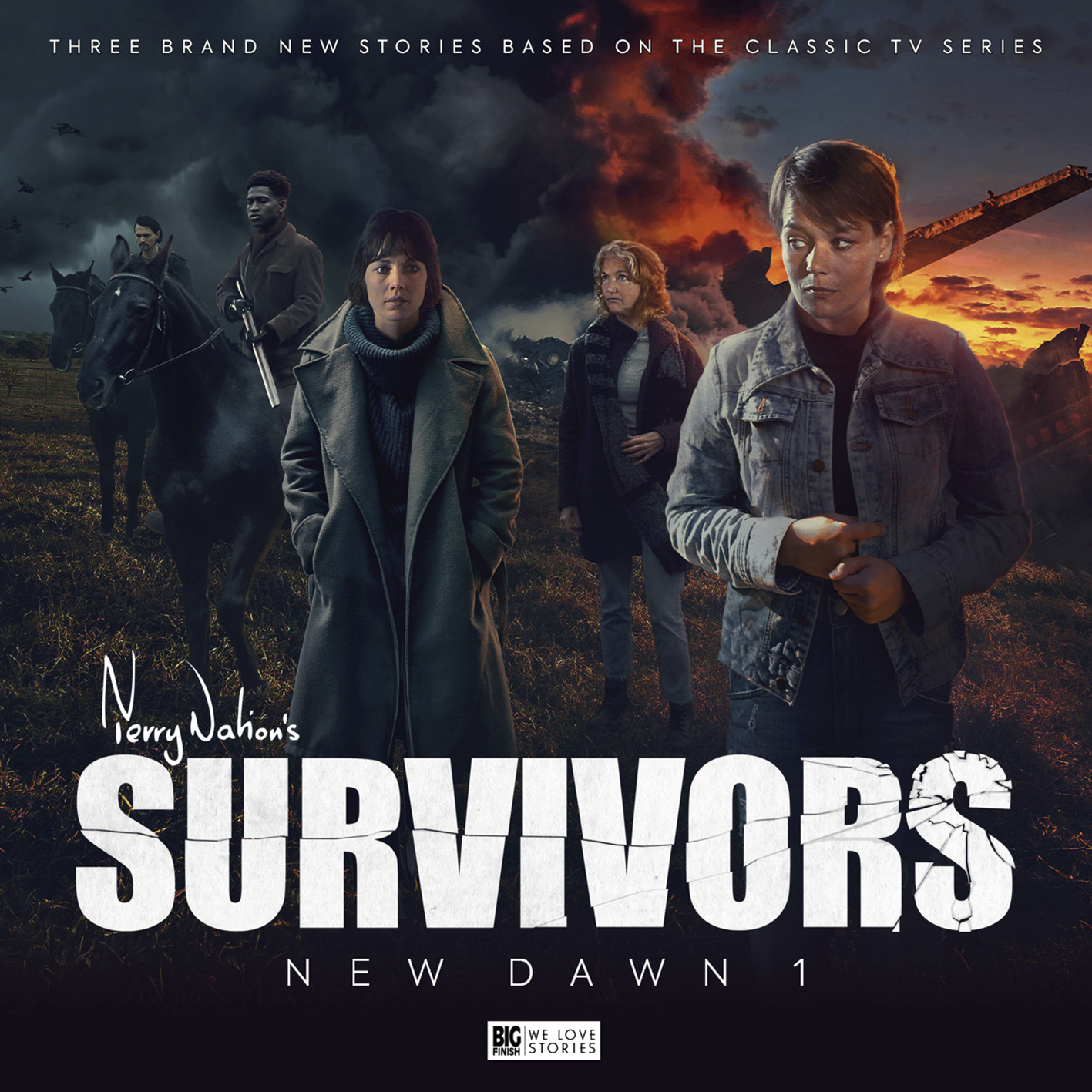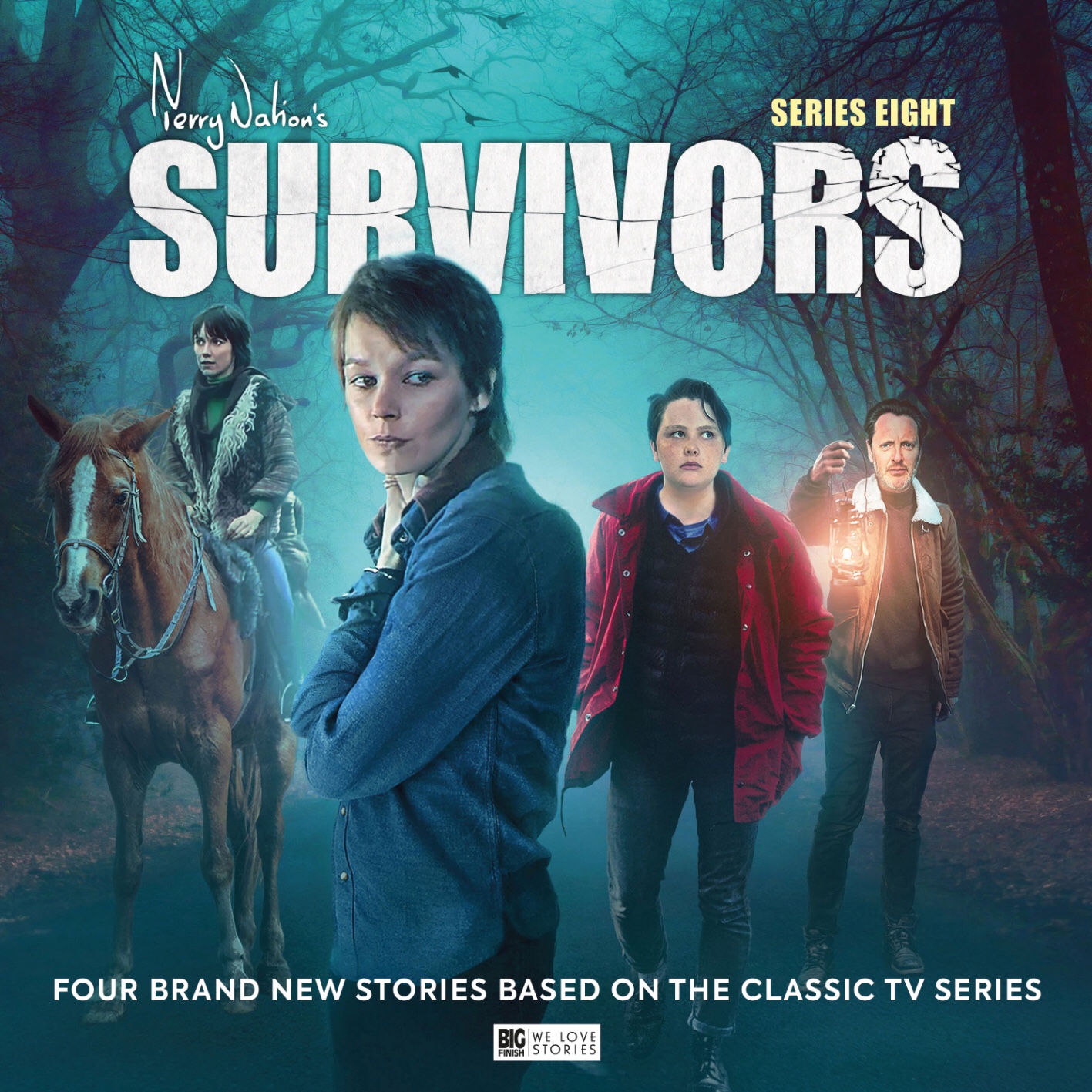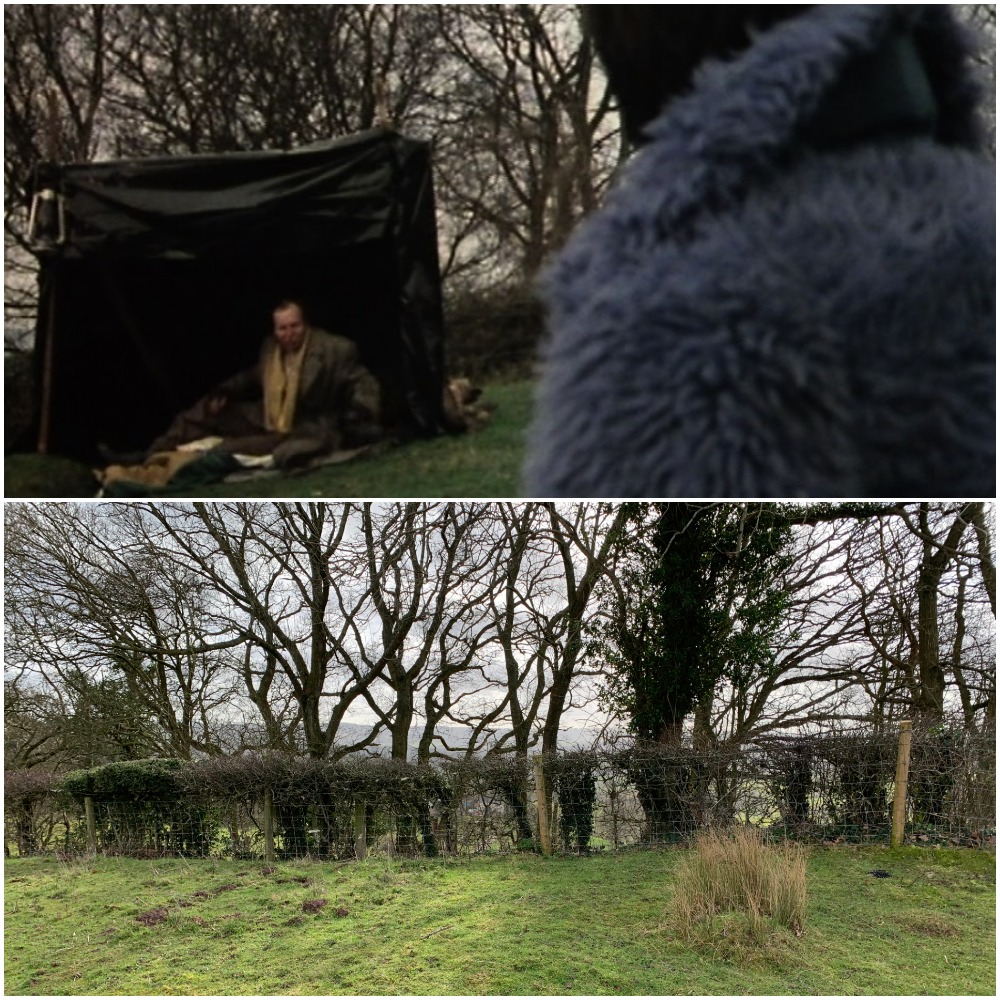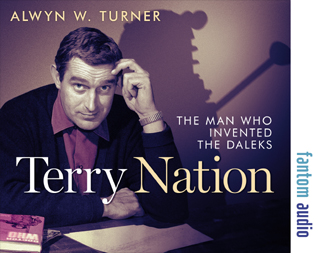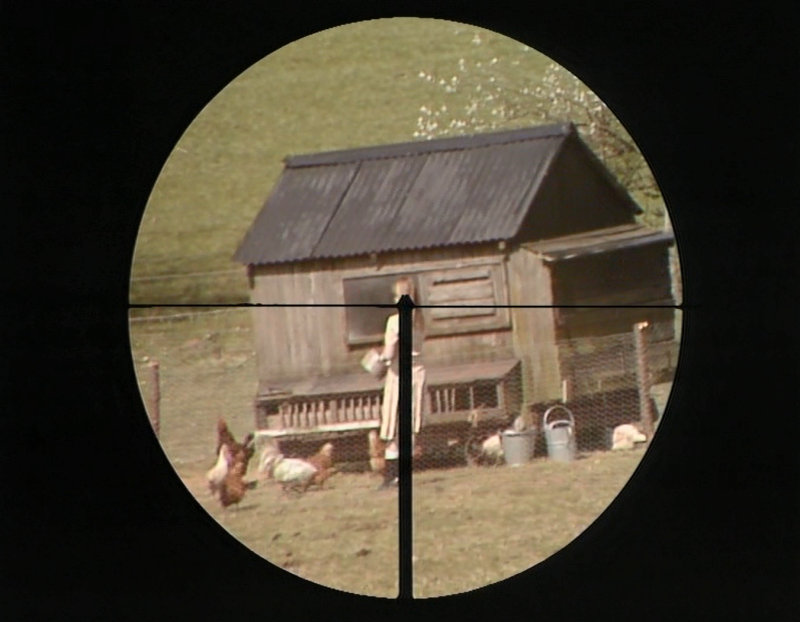
IN ITS 'INSTANT guide' to the series, publicising the start of a full Survivors re-run on UK Gold, the August 1996 edition of Cult Times placed A Friend in Need among the top six episodes of the series.
The events of A Friend in Need, the first of three Survivors episodes to be written by lan McCulloch (Greg Preston), take place exactly half-way through the series' second series. It is the first real adventure romp of that series, echoing the mood and pace of first series episodes like Something of Value and Spoil of War.
There are two central themes to A Friend in Need. The first, and dominant, storyline concerns the struggle to track down a serial sniper who is targeting young women settlers in communities on a direct line through Whitecross. This element of the story provides the episode's action, drama and narrative drive. The second, lower key, storyline concerns Greg and Charles' continuing efforts to establish mutual-aid networks amongst the scattered communities in their region. This storyline, although quickly sidelined by the murder inquiry, provides the episode's political commentary. While the sniper plot is a 'stand-alone' story, the battle to construct alliances between settlements picks up themes first raised in series one's finale A Beginning, which go on to become one of the dominant themes of series three.
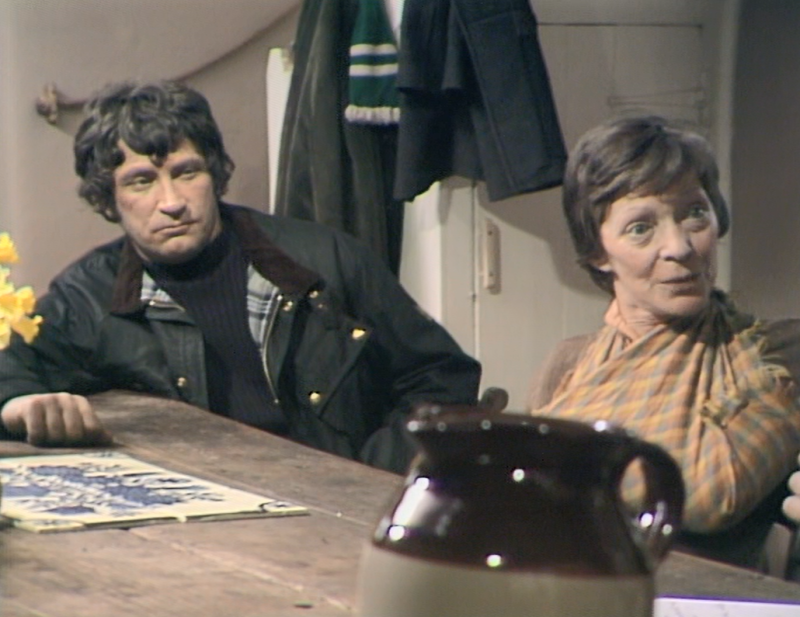
A Friend in Need opens in shocking style. A breathless black-clad sniper hidden among the trees lifts up his rifle and takes aim at his target, a solitary young woman tending a chicken coop. As his intended victim goes about her work unawares, the sniper squeezes the trigger. As his finger tightens, the scene cuts. The crack of the shot is replaced by the sight and sound of Charles banging his fist on the table, as he tries to bring order to a bad tempered meeting underway at Whitecross.
Mapping out the murder locations, Greg and Charles suggest that the sniper must be picking out targets close to an old Roman road
Rich Cross
Representatives of several nearby settlements have been invited to discuss the formation of a defensive alliance, and to agree to the drawing up of a 'Domesday type account' of resources, weaponry, skills and professions that will make the strengths and shortcomings of each settlement 'transparent' and encourage greater co-operation between them. With the difficult meeting approaching deadlock, Jenny arrives to break the news that Betty, the 18-year-old 'wife' of Millbrook delegate Roberts has been murdered in a sniper attack at their community. The meeting ends in sombre mood, with little settled. Early the next morning, Greg and Charles accompany Roberts on his return home. At the murder scene they quickly locate the sniper's firing position, find a spent .303 cartridge and discover tell-tale footprints in the mud. Charles notices that the boot marks appear "irregular". Greg reasons that "he's a cripple."
Back at Whitecross, those members of the community not away on 'salt detail' gather to discuss the sniper threat. Charles and Greg have learnt that there have been a total of eight similar killings in the previous five months. Mapping out the murder locations, Greg and Charles suggest that the sniper must be picking out targets close to an old Roman road running from east to west across the region. After the hit at Millbrook, Whitecross and two other communities are the next obvious potential targets.
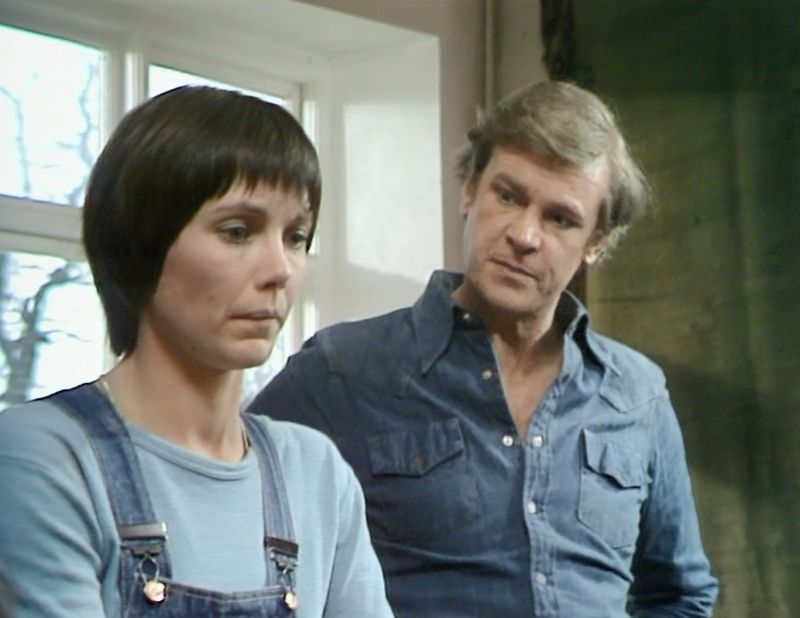
Meanwhile, as John and Lizzie return two unloaded rifles to their store, John dislodges the firing pin on one. Unaware of its importance, John pockets the pin — disarming the gun. The Whitecross community agrees on a twin response to the threat: strict safety measures to frustrate the assassin, together with a concerted effort to detect or entrap him. Jenny reveals she has a theory about the sniper's identity: "It sounds silly", she suggests, "it could be Vic". Everyone assumed that Vic had perished in the fire at the Grange. Had he survived but been "left crippled and helpless for a second time", he might, Jenny suggests, have been overwhelmed with a desire for revenge. Greg is dismissive of the idea.
Tension and a false alarm
Over the next two days, the tense community keeps watch and waits. A false alarm is raised when Hubert spots a solitary figure approaching the settlement. The arrival of Daniela, a wandering survivor delighted that she is no longer alone and on the road, distracts the community and temporarily disguises the assassin's own arrival at Whitecross. The next morning, a security patrol by Arthur, Greg and Charles discover evidence of the sniper's presence, including a rabbit snare cut by a knife.
The community meets again to reassess its strategy. There is a fierce argument over how the killer should be trapped, and what should happen after his capture. Greg is adamant that the protection of the community must always be paramount, Charles insists that the community must hang on to key principles of justice and 'due process'. Finally, Jenny and Pet agree to take it in turns to act as 'bait' to lure the sniper into a trap. Jenny, who is to take the first shift, still believes the sniper might be Vic, who she is certain could not bring himself to hurt her.
That evening Jenny takes up position at an 'ideal' spot, offering the sniper an enticing target. Armed with both weapons and binoculars Greg and Hubert, and Charles and Arthur, hide themselves amongst the trees. Tensions rise as the day drags on towards dusk. Suddenly, a startled pigeon takes flight from amongst a clump of trees, alerting everyone to the killer's presence. As the sniper lines up Jenny in his sights, Greg steps into the line of fire and the gunman abandons the hit.
A shot rings out and the line of beaters breaks down as people rush to investigate
Rich Cross
The community gathers to discuss their next move. Greg suggests that with enough outside help a large group of 'beaters' could sweep down through the woods, flush the sniper out, and drive him into an ambush. Charles and Arthur set out to on what proves a fruitless visit to other nearby communities to summon help for the hunt. Charles tells Greg bluntly that "you made a pretty unfavourable impression at the meeting" and, because of the distrust that that generated, other settlements were "not prepared to take our word for it." To general surprise and relief Boult arrives bringing extra guns and four other armed men with him, and explaining that he had deployed an armoured car to stop him "breaking out eastwards". A collective effort to drive the sniper out is agreed.
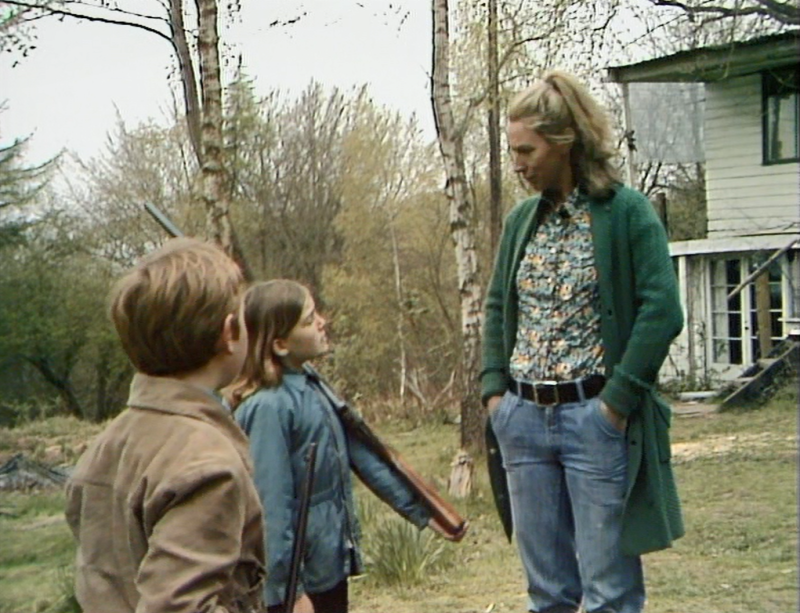
In the early morning the sniper is roused from his sleep in a panic as the noise of the beaters fills the wood. He vainly attempts to disguise his camp before fleeing, carrying only his rifle. A shot rings out and the line of beaters breaks down as people rush to investigate. Hubert has killed a fox, another Whitecross predator, yet in the disarray the sniper has slipped through the cordon. Arthur locates the sniper's makeshift camp and his recently filled water bottle. With Boult's men deployed to seal off the woods, Charles and Greg hide out down by the lower pond, confident that thirst will eventually drive the sniper down to the only fresh water supply he can reach. Two nights pass without incident, and Boult's men are eager to call it a day.
A final showdown
Back at Whitecross, Jenny evades the children's questions about Greg and Charles' vigil. John owns up to having pocketed a piece of metal from one of the guns. Arthur confirms that it is the firing pin. Jenny remembers that Charles took the shotgun and may be left defenceless. She rushes to warn them. Sensing the adults' alarm, yet not knowing the risk, the children race to confess to Greg themselves first.
The sniper meanwhile has spotted Greg and Charles' hiding place and begins blasting away at them. Under covering fire, Greg breaks away — swopping his rifle for the useless shotgun — to work his way round behind the sniper's firing point. Hiding behind a tree Greg takes aim and fires at the sniper — the gun clicks and nothing happens. Shouting their warning the children rush towards Charles, just as Jenny arrives. Charles shoots off his last round to protect them. Desperate for a weapon Greg finds the severed rabbit snare still in his pocket. Greg launches himself at the sniper, choking him with it. Both men tumble backwards out of sight and a single shot is heard. The sniper emerges, walking out of the woods towards Jenny and Charles. "Kill him!" cries a petrified Jenny. Charles says blankly that he has no ammunition left. The pair are frozen to the spot. As the sniper moves to take aim he falls to the ground. The figure of Greg appears, assuring Jenny that he is unhurt, and making plain that the sniper was fatally wounded by his own gun in the fight.
The three adults and two children gather around the body. Charles finds proof of the sniper's identity. The killer's name is 'George Oliver'. The corpse is filthy and lice infested. John looks down on the body. "Poor lady", he remarks, "poor lady. Why did she have to die?". Greg looks at Charles who nods in confirmation. The serial sniper is revealed as female. As the theme tune swells, the credits roll.
A number of facts about McCulloch's approach to the script writing of A Friend in Need do him credit. For a start, he is true to the essence of the character of Greg: some actors might have been tempted to paint his own character as less irascible, difficult or heavy handed. At the opening settlements' meeting, Preston deals with the situation badly. His ability to alienate the delegates is given narrative purpose later in the story when the communities, with the exception of Boult's, decline to come to their aid. Greg's bullishness has put the whole of Whitecross at risk. Secondly, it is interesting to see that McCulloch does not take an obvious opportunity to sideline Charles (Denis Lill). Given the tensions that existed between the two actors, it might not have been surprising if Charles had found himself on 'salt detail', or left at Whitecross while Greg was despatched to Millbrook to solve the crime. Yet Charles and Greg share equal screen time and significance, even if Greg does get the final showdown with the sniper.
A hand-held camera follows the sniper's panic flight through the woods
Rich Cross
There is good use made in A Friend in Need of the locations around Whitecross. In other series two episodes there is sometimes an over-reliance on kitchen-table settings. Where the Grange (the mansion house setting for the latter part of series one) was spacious, with large rooms, high ceilings and wide staircases, the Whitecross interiors often appear cramped and constricting. This is immediately apparent in the second series' opener Birth of a Hope when all the new residents, alongside Charles, Hubert and Pet are stuffed into a single room with barely space for the camera crew. In A Friend in Need the storyline is opened up to make use of the woods, fields and open countryside around Whitecross. All this is helped by some strong direction and confident editing that plays to the strengths in McCulloch's script.
There are some inventive camera shots and narrative devices that help push the adventure elements of the story forward. The camera pans down on Whitecross from the top of the windmill, sets up distance shots of Charles and Greg's horseback patrols, and sweeps across the woods as the 'beating' begins. The camera takes the sniper's 'point of view' as the gun sights are lined up. A hand-held camera follows the sniper's panic flight through the woods. When Jenny steps out as the sniper's prey for the first time, Charles' speech at the meeting becomes a 'voice-over' that effectively emphasises her vulnerability. All of these are simple enough devices, yet they are not always present in series two episodes.
Continuity and tying up the threads
There are several story elements in A Friend in Need that pick up threads from previous Survivors stories. Mostly this works effectively, though a couple of continuity problems are apparent.
The attempt to draw settlements together into a defensive alliance is clearly an extension of the project first suggested by Arthur in A Beginning, the optimistic concluding episode of the first series. That time round delegates began to arrive at the Grange just as Arthur had all but given up on the plan. We never learn what might have been agreed at that tentative first meeting.
In A Friend in Need the project appears to be back to square one, and this time the interest of local communities more muted and cautious. This need not be a continuity problem, given the community's forced relocation from the Grange to Whitecross. It seems reasonable to suggest that within regions some settlements would be introspective, parochial and concerned to protect their absolute autonomy, while others would be more outward looking, proactive and keen to pool resources and maximize collective effort. Even moving a few tens of miles might produce a sharply different political balance between settlements within a given radius.
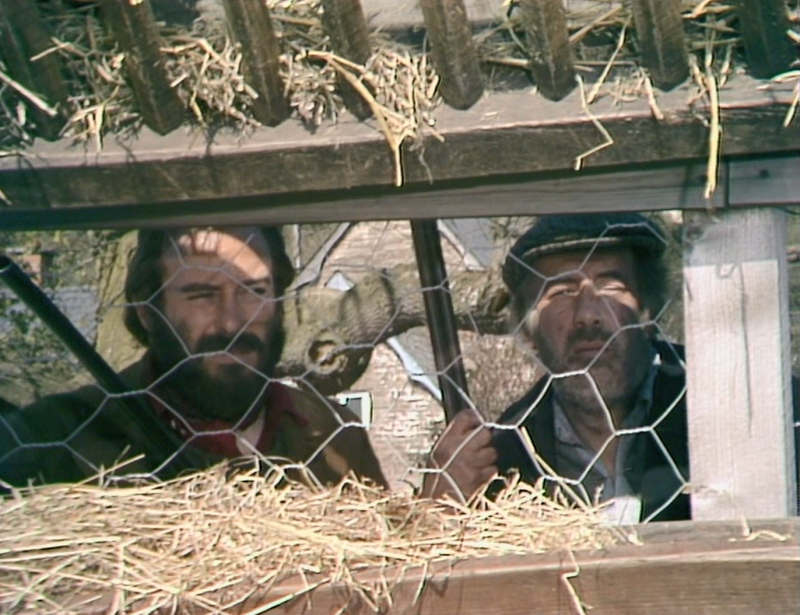
Yet the problem remains that no reference is made to the survivors' earlier efforts down this road. Greg's amnesia leaves Whitecross trying to convince other delegates to support a project that apparently without precedent. Learning of the strengths and weaknesses of the previous experiment at the Grange — however far it progressed before the blaze — might have helped to convince doubters at the meeting of the strength of Whitecross's case.
Much more of a continuity problem is the fact that by the time of A Friend In Need, the truth about the murder of Wendy appears to have become common knowledge.
In the classic first series episode Law and Order, Tom Price kills Wendy in a drunken rage after the May Day celebration at the Grange, yet Price frames the 'intellectually challenged' Barney for the murder. After an impromptu trial, the community agree by majority vote that Barney is guilty and must be executed. After Greg has carried out the sentence, he and Abby discover the awful truth of Price's crime. Abby believes that the community must be told, but Greg demands that the news be kept from them. Reluctantly, Abby agrees. Two of the surviving Grange residents, Jenny and Arthur, should both still be unaware that they were party to the conviction and execution of an innocent man. Yet at the second meeting to discuss the sniper crisis, Jenny reacts to Greg's angry impatience by saying, in front of everyone: "Greg, we killed Barney. You were just as sure then as you are now, and you were wrong. We made a mistake. "
This seems to be an important error in one of two senses: either it was a simple flaw in plot continuity which no-one picked up on, or it was the conscious waste of powerful dramatic material, which allowed the explosive truth about Barney and Tom Price to have come out 'off-camera' between series. Yet even this is problematic. In Law and Order Greg had refused to let Abby tell the others the truth, fearful of the psychological impact on group morale that learning of their collective complicity in the murder of Barney might have had. Given that since the trial the survivors had already had to endure the loss of Abby, the fatal fire at the Grange, the death of Paul, the risky birth of Paul (jnr) and the dangers of the Lights of London, it's hard to see that Greg's views on the issue would have softened in the months since the trial.
Does the ending work?
There are, I think, a number of problems with the story's denouement. First, there is the issue of Vic. McCulloch's script makes a point of singling out Vic as a potential suspect, despite the fact that his injuries make him a most incredible wandering assassin, even if he had survived the fire — as Greg himself makes plain. Yet having set this premise up, nothing is done with it. This is especially odd because Jenny agrees to act as 'bait' precisely because she believes, for reasons not really explained, that Vic would not hurt her.
It might have been more interesting if Jenny's belief had been given some narrative pay-off
Rich Cross
The fact that Jenny's conviction evaporates as the fatally wounded sniper staggers out of the woods towards her, when she urges Charles to "kill him", is perfectly credible. Confronted with the terrible physical reality of the sniper in a kill-or-be-killed shoot-out (with Greg apparently lying dead in the woods) Jenny's survival instinct could easily overwhelm her unfounded beliefs about the sniper's identity. Yet it might have been more interesting if Jenny's belief had been given some narrative pay-off at the end: perhaps with Jenny running towards the sniper pleading with 'Vic' not to shoot, and obscuring Charles' line of fire (assuming he had bullets) in the process? As it is, the 'Vic' story line is simply left hanging.
The second problem is the lack of any explanation to account for the murder spree. At the conclusion, we learn nothing of the motives or 'back story' of the killer, which is not only unsatisfying — given the detail the script provides on the killer's operations — but also a dramatic waste. A lone crippled female assassin is travelling a particular route picking off young women as she passes. But because we are told nothing about her reasoning, the serial murders remain arbitrary. The killer might just as well have targeted groups of middle-aged men while following the route of an old railway line.
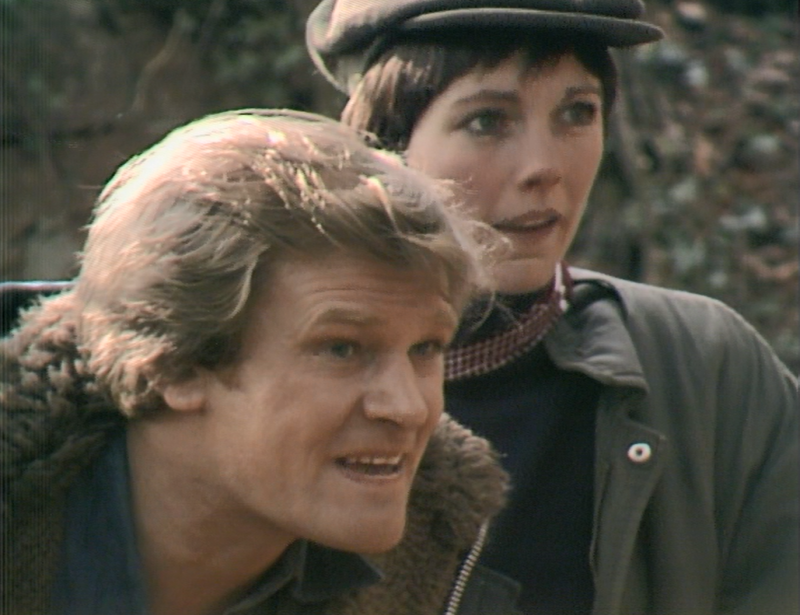
Another omission is that there is no resolution to the fierce debate at Whitecross about the ideas of justice, 'due process' and punishment. Because the killer dies, there is no 'trial', no 'sentence' and no exploration of the themes first touched upon in Law and Order. Had the sniper survived, Whitecross would have been confronted with the need to involve eight other settlements in a complex and heated 'trial' process. This in turn might have led to discussions on a new regional 'legal' code, on the treatment of suspects 'under investigation', and on the idea of a common and equitable 'punishment scale'. However fascinating such a discussion might have been, it would have immediately exceeded the limitations of a single episode slot. In all probability it is also not the kind of dramatic material that would have appealed to lan McCulloch as a script writer.
The killer without a face
The third problem concerns the portrayal of the killer. The surprise discovery that the killer is female, is not so much heightened as made ridiculous by the fact that, from the very first shot of the sniper's hand, there is simply no question that 'she' is male. From the gait, build and movement of the sniper there is never any doubt that the role is being played by an actor (Andrew Bradford) and not by an actress. For the ending to shock in the way McCulloch must have intended, the audience needed to see, against expectation, that the killer was female. The lack of a close-up on the body of the sniper serves to emphasise how implausible the 'twist' is.
There is one final problem. The script gives the last and most important line in the story to John (Stephen Dudley). The dramatic impact of the entire episode rests upon its delivery. Given that the acting abilities of young Stephen were well known to McCulloch by this point in the series, it seems a little unfair to have put the pressure on him to 'carry' the decisive plot twist in this way.
The result, I think, is that the moment is not as strong as it should be. John's line needs to reveal the twist, but it does so in an awkward way. After pitying the 'poor lady' John asks "why did she have to die?". He is given the line partly to emphasise that the children have been kept in the dark about the sniper threat, and partly to contrast their innocence with the brutal struggle for survival facing the adults. A struggle which forces them to act in ways that, before the Death, would have appalled them.
Yet the fact remains that both children have just witnessed a gun battle, and a hand-to-hand life-or-death struggle between Greg and an armed and hostile stranger. Would either John or Lizzie have been surprised or shocked by the death of an armed assailant who shot at Charles and attacked Greg? As early as the poignant Gone to the Angels, the fifth episode of the first series, John appears resigned and matter-of-fact even about the death of new friends, never mind that of violent strangers.
A powerful, confident, no-nonsense episode, which sees lan McCulloch offering a highly impressive debut script
Rich Cross
Taken together these problems also make the ending feel both rushed and premature. Arthur suggests earlier in the episode "I think it might be a valuable exercise to find out this chap's motive, whoever it is." Yet the survivors, like the audience, leave the episode none the wiser. As a final thought, it's somewhat ironic that it is this very plot 'twist' that dates this episode of Survivors. Twenty years on, the fact that the sniper is revealed as a woman and not as a man would carry much less dramatic clout with a mass TV audience today than it probably did on prime time British television in the mid-1970s.
None of these issues detract from the fact that A Friend in Need is a powerful, confident, no-nonsense Survivors episode, which sees lan McCulloch offering a highly impressive debut script. McCulloch successfully crams a lot in to his fifty minutes: a dramatic murder mystery, community tension over crime and punishment, political division over future settlement strategy, together with the introduction of a new character in the shape of Daniela. A Friend in Need is a fast-paced action story that makes maximum use of its central locations, and which shares out screen time amongst its talented ensemble cast, encouraging strong performances all round. It is an attention-grabbing episode in its own right and it contrasts effectively with other less adventure-driven series two episodes around it.
Rich Cross
Cite this web page
Cross, R. (2021). 'A Friend in Need,' [online] Survivors: A World Away, 31 January. Available at: https://www.survivors-mad-dog.org.uk/a-world-away/Archive_Rev_FN.php. Accessed on: 03 March 2026.
Current style: Harvard
TAGS

